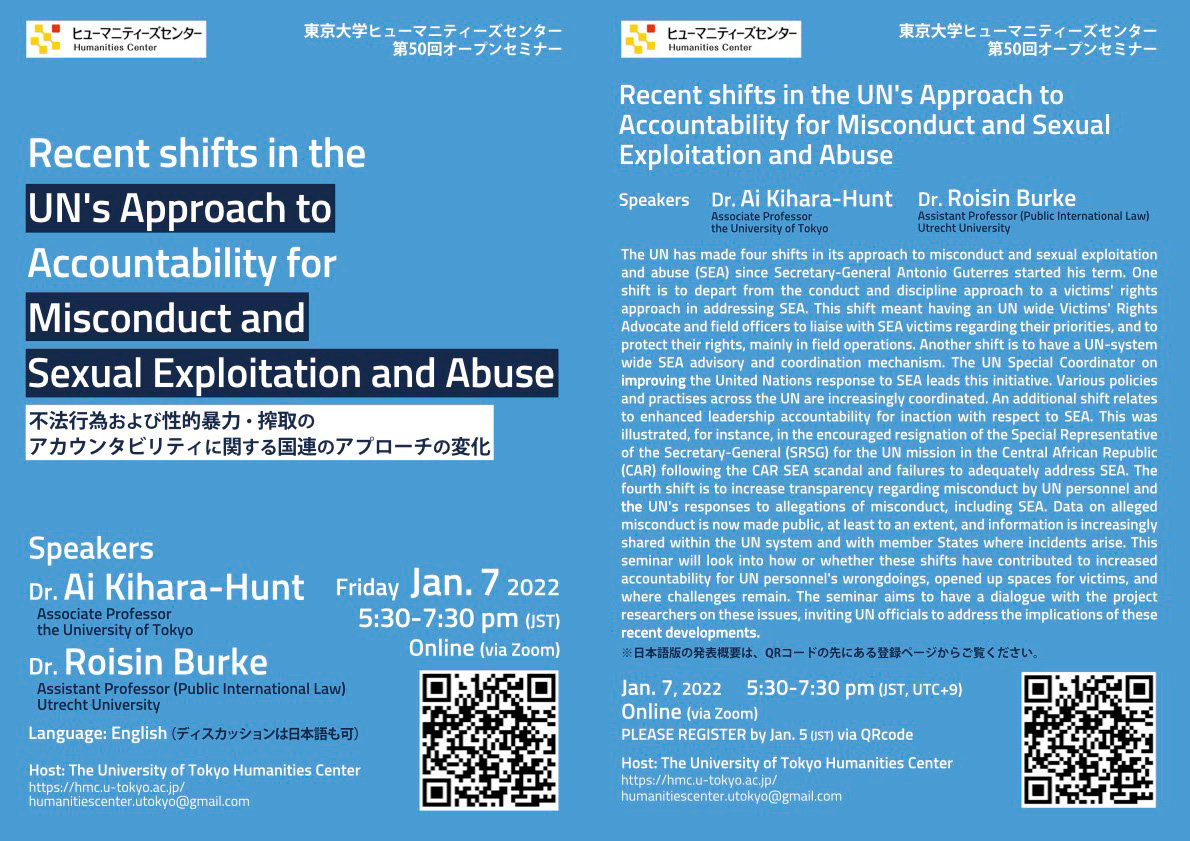Recent shifts in the UN’s Approach to Accountability for Misconduct and Sexual Exploitation and Abuse
不法行為および性的暴力・搾取のアカウンタビリティに関する国連のアプローチの変化

- Date & Time: Friday, January 7, 2022, 5:30-7:30pm (JST, UTC+9)
日時:2022年1月7日(金)17:30-19:30 - Venue: Online (via Zoom Meeting)
場所:オンライン開催 - Speakers(報告者)
- Ai Kihara-Hunt(キハラハント愛), Associate Professor, the University of Tokyo
- Roisin Burke(ロシーン・ブルケ), Assistant Professor (Public International Law), Utrecht University
- Maria Fernanda Perez Solla(マリア・フェルナンダ・ペレツ・ソッラ), Senior Victims' Rights Officer, United Nations, Multidimensional Integrated Stabilization Mission in the Central African Republic (MINUSCA)
- Assistant Secretary-General Jane Connors(ジェーン・コナーズ 国連事務次長補), Victims' Rights Advocate, the United Nations
- Language: English(ディスカッションは日本語も可)
- Registration: Please register below by January 5 (JST).
申込:1月5日(水)締切で、下記の様式でお申し込みください。 - Host: The University of Tokyo Humanities Center
主催:東京大学ヒューマニティーズセンター
概要(英語・日本語)は申し込みフォームの下にございます。
The UN has made four shifts in its approach to misconduct and sexual exploitation and abuse (SEA) since Secretary-General Antonio Guterres started his term. One shift is to depart from the conduct and discipline approach to a victims' rights approach in addressing SEA. This shift meant having a UN wide Victims' Rights Advocate and field officers to liaise with SEA victims regarding their priorities, and to protect their rights, mainly in field operations. Another shift is to have a UN-system wide SEA advisory and coordination mechanism. The UN Special Coordinator on improving the United Nations response to SEA leads this initiative. Various policies and practises across the UN are increasingly coordinated. An additional shift relates to enhanced leadership accountability for inaction with respect to SEA. This was illustrated, for instance, in the encouraged resignation of the Special Representative of the Secretary-General (SRSG) for the UN mission in the Central African Republic (CAR) following the CAR SEA scandal and failures to adequately address SEA. The fourth shift is to increase transparency regarding misconduct by UN personnel and the UN's responses to allegations of misconduct, including SEA. Data on alleged misconduct is now made public, at least to an extent, and information is increasingly shared within the UN system and with member States where incidents arise. This seminar will look into how or whether these shifts have contributed to increased accountability for UN personnel's wrongdoings, opened up spaces for victims, and where challenges remain. The researchers are joined by Assistant Secretary-General Ms. Jane Connors, Victims' Rights Advocate, and Senior Victims' Rights Officer working in the UN mission in the Central African Republic, to address how these recent developments are implemented at the UN and in the field and to discuss the implications of these changes.
アントニオ・グテーレス事務総長が任期を開始して以来、国連の不法行為および性的暴力・搾取(SEA)へのアプローチに4つの変化があった。1つ目は、SEAへの対処策が、行動規範と内部規律のアプローチから逸脱し、被害者の権利を中心とするアプローチへと変化したことである。この変化は、主に国連平和活動などのフィールドにおいて、SEAの被害者の希望を優先し、彼らの権利を保護するために、本部の国連被害者の権利アドボケート、フィールドにその代表を配置することを意味した。2つ目は、国連システム全体のSEA予防・アカウンタビリティのメカニズムの設置である。 SEAに対する国連の対応の改善に関する国連特別コーディネーターがこのイニシアチブを主導しており、国連全体のさまざまな政策と慣行の調整が進められている。3つ目は、SEAに関して、リーダーシップの不作為に対するアカウンタビリティの強化である。これは、例えば、中央アフリカ共和国の平和活動において、SEAの訴えに適切に対処しなかったことを理由に、事務総長特別代表(SRSG)を辞任させたことが有名である。4つ目は、国連職員・要員によるSEAを含む不法行為の申し立てに対する国連の対応について透明性を高めていることだ。申し立てられた不法行為に関するデータは現在、ある程度公開されており、詳細な情報についても、国連システム内部、および関係する国連加盟国との間では、共有されるようになってきた。今回のセミナーでは、これらの変化が国連職員・要員の不法行為に対するアカウンタビリティの向上にどのように貢献しているか、被害者の権利を効果的に保護することができるようになってきたかどうか、そして残る課題は何かについて議論する。このセミナーでは、これらの問題について、国連被害者の権利アドボケートのジェーン・コナーズ事務次長補と、中央アフリカにおけるミッションの上級被害者の権利担当官を招聘してプロジェクト研究者と対話し、最近の国連の政策の発展が実際にどのように執行されているか、また、それらのアカウンタビリティと被害者の権利への影響について考えることを目的とする。


